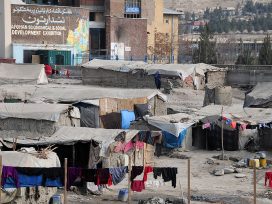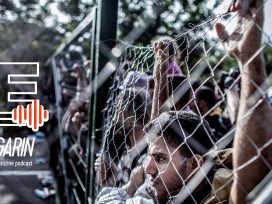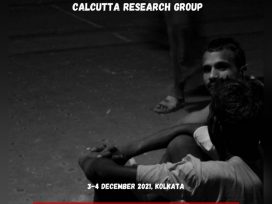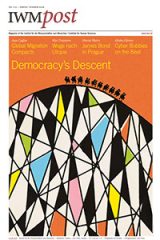

In collaboration with
Institute for Human Sciences
The Institute for Human Sciences / Institut für die Wissenschaften vom Menschen (IWM) is an independent institute for advanced study in the humanities and social sciences. Since its foundation in 1982, it has hosted more than 1500 scholars, journalists and translators from all over the world. Many of the Institute’s Permanent and Visiting Fellows are regular contributors to Eurozine or its focal points Eurasia in Global Dialogue and Ukraine in European Dialogue (see below).
Website: www.iwm.at
Twitter: @IWM_Vienna
Youtube: IWMVienna

Articles

Life as death
How Afghan refugees aren’t offered real solutions
More than half a million Afghans were displaced in 2021, adding to many more forced to flee over decades of uninterrupted violence. But offers to accommodate Afghanistan’s ‘living dead’ are often conditional on obscure definitions of neediness.

Europe is facing a demographic crisis, resulting in suffocating labour shortages, and yet incoming migration is more and more rejected in mainstream politics. Can the EU come to terms with this great contradiction without an implosion?

Mutations of science in the pandemic
The structure of pseudoscientific revolutions
Scientific pundits fear that the spread of anti-science will destroy western civilization, while covid-sceptics panic about a lurking dictatorship in which freedoms are sacrificed to healthcare measures. Where is the truth? And how is the ongoing public health crisis changing our relationship with science?

Reporting on migrants and refugees in Europe and Asia
Virtual discussion on 3 Dec at 4PM IST (11:30 CET)
Tune in for a live conversation with journalists on how migration and refugees are represented in India, Thailand and Bangladesh, in contrast with European media trends.
Focal points

Inspired by a lecture that Clifford Geertz delivered in 1995 at the Institute for Human Sciences in Vienna, this focal point engages with ‘deep diversity’, ‘a sense of dispersion, of particularity, of complexity and of uncenteredness’ rather than unified world order. It follows the launch of a research programme of the same name at the institute in January 2023.

Post-revolutionary Ukrainian society displays a unique mix of hope, enthusiasm, social creativity, collective trauma of war, radicalism and disillusionment. With the Maidan becoming history, the focal point ‘Ukraine in European Dialogue’ explores the new challenges facing the young democracy, its place in Europe, and the lessons it might offer for the future of the European project.
Projects and publications

